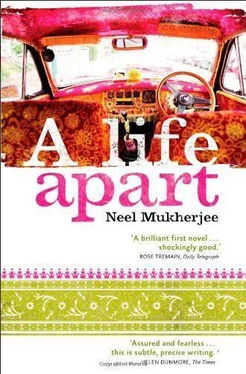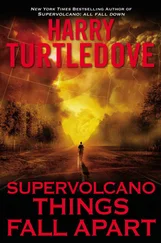Neel Mukherjee
A Life Apart
History isn’t only what we inherit, safe and sound and after the fact; it is also what we are ourselves obliged to endure.
‘Public Intellectuals’, Cynthia Ozick, Quarrel & Quandary.
And now the sun had stretched out all the hills,
And now was dropped into the western bay;
At last he rose, and twitched his mantle blue:
Tomorrow to fresh woods, and pastures new.
‘Lycidas’, John Milton.
And then another problem reared its head. When Miss Gilby had first entered the inner courtyard there had been a great deal of trouble that had lasted quite some time. Eventually, the whole thing had got buried under the routine and rhythms of quotidian life. But soon everything was raked up again; I hadn’t given much thought to Miss Gilby’s nationality for a long time but now I began to do so. I said to my husband, ‘I think you should ask her to leave.’ He kept quiet. I said a lot of unpleasant things to him. He heard me out, silent and sad, and then left the room. I sulked and cried for a while. That night, he said to me, ‘Bimala, I cannot see Miss Gilby as just an English woman and nothing more. Does the fact that you’ve known her for so long count as nothing? Is her Englishness everything? Don’t you understand how fond she is of you?’
I felt ashamed but couldn’t swallow my pride entirely and agree that he was right. So I said, somewhat petulantly, ‘All right, then, let her stay. Who’s asked her to leave?’
from ‘Bimala’s autobiography’, Rabindranath Tagore, The Home and the World.
There was a queue for electric furnaces at Kalighat crematorium on the eleventh of October. Ritwik did not know how long he had to wait before one became available.
‘You have to wait, like everyone else. No corpse is privileged over the other. You can’t hurry death, do you understand?’ he was told by one of the furnace attendants, as if he had asked to jump the queue when all he had wanted to know was how long it would take. He reasoned he would much rather a longer wait for he did not want to go through that bristling panoply of rituals before the sliding rails carried his mother’s body into the heart of fire, in full, cleansing view of everyone. When the moment arrived, he knew he had been dreading it with a cold, randomly clutching-and-unclutching grip in his bowels. His mother’s body had been laid out on a criss-cross frame of cheap wood that formed a ramshackle stretcher, secured to it with rough coir ropes and covered with a white, coarse sheet; her head had been left exposed. It nodded and lolled like a floppy doll’s as the stretcher was placed in front of one of the three furnaces that would ultimately devour her.
The Brahmin priest was already there, more a harried figure doing brisk business than a sombre religious person. A distracted, infinitely bored look had seeped its way into his stubbly face through years of practice in the death trade: it was an irremovable mask now, his only skin. His eyes were the yellow of mangled fried eggs and he had foul breath.
‘Are you wearing any animal products? You’ll have to remove them,’ he said to Ritwik.
‘What animal products? Leather?’ Ritwik wasn’t sure what he had to remove.
‘Yes, leather, wool, anything made with horn. You will have to take off your shirt as well.’ From the complete absence of tone, he might as well have been reading out a lesson he had taught every day for decades to a bunch of vapid children.
Ritwik undid his borrowed watch — the strap was made of leather — and handed it to his brother, Aritra. He then took off his shirt and stood there, naked to the waist.
‘What about the belt? Is that made of leather?’ the priest asked. Those sick yellow eyes didn’t miss a thing.
‘Yes, I think it is,’ Ritwik said, ‘but I can’t take it off. My jeans are three sizes too big for me; if I remove it, they’ll just slip off.’
There was the noise, no, not even noise, but the atmospheric charge, of a dutifully suppressed titter of shock around him. As the priest grudgingly assented or ignored, he could not figure out which, he was handed a bundle of burning faggots and asked to circle his mother seven times and touch the barely burning straw-and-twigs to her grey face every time he reached her head during the circling. This then was mukhagni , the fire-to-the-face ritual that initiated the funeral process and without which it was unsanctioned and incomplete, this the very act that had made him shy away from all the ceremonies which were the first-born son’s duty at his father’s cremation eleven days ago. But now he did not have the heart, or the steeliness of will, to send along his mother without the reckoning, with all the imperfections on her head.
Ritwik suddenly had a suspicion of a supremely ironic design of Things, with a malignant sense of humour, which had brought him to perform what he had so wilfully avoided a few days ago. Someone was laughing somewhere, he thought, as he turned his head away every time he branded his mother’s dead face: it left a black, ashy singe wherever it touched. His stomach heaved, letting him know that it had been empty for a very long time, and a malicious spurt of acid moved up swiftly behind his chest bone, his throat, impatient to enter his mouth, but he swallowed the sour fire.
The wooden stretcher with his mother on it was positioned on the rails; it slid shudderingly along them towards the door of the furnace with insides of consuming fire. The body entered it, the door shut all from fire to fire, while he stood outside in his intolerable shirt of flame and a wail went up from a clot of numbed people in front of another furnace, the sound like a refraction in a distorting mirror. This then was the atomised end, the final breakdown into the fundamental particles. It will take an hour and a half for it to be over, come away now, come . Ninety minutes was too too long for a human body, wasn’t it? Did it burn like paper to an infinitely curling hyaline thinness, his mother escaping out of a flue somewhere upwards and ascending still. .
Two days after they took her to the hospital, Ritwik’s mother died. The whisper everywhere was that his father had taken his mother away. ‘Pulled her away to him,’ everyone said. Otherwise, how could one explain the abnormally small gap of eleven days, eleven days , between the two deaths? To Ritwik, everyone seemed scared at this sign of the workings of a world beyond the here and now, as if their lives had been momentarily lit by a cruel, grand flash of the great unknown, a reminder of something ineffable, then plunged back into their dim, quotidian greyness again. He detected a faint whiff of an ‘I told you so’ attitude in his uncles, his aunts, the neighbours, or was that just imagined? But there was no mistaking the holy dread at what was being discussed as the bond that worked beyond human life.
On the day it happened — grey, close, the no-time between afternoon and dusk — Ritwik was sitting on the floor of his uncle Pradip’s room, indifferently pushing around the cold rice and dal and vegetables on the stainless steel plate in front of him, with relatives and neighbours sitting around, waiting and watching for signs of grief at his father’s death nine days ago. This parliament of vultures had been gathering for the last week to circle around that one death when it looked as if it could suddenly, thrillingly, jump up to two. Their piously suppressed excitement provided a tight murmur in the background, like the muffled buzzing of bees: grief offered such a delicious peek into the minutiae of other people’s lives.
Читать дальше












